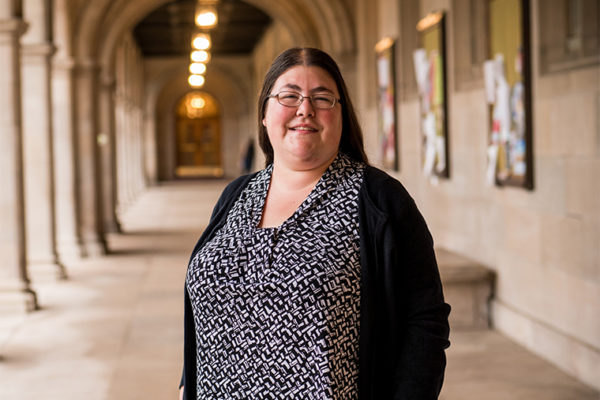Engineering proteins to help counter devastating diseases
Meredith Jackrel, assistant professor of chemistry in Arts & Sciences, recently received a five-year grant from the National Institutes of Health (NIH) and another from the Longer Life Foundation to study protein disaggregases — evolved protein forms that mitigate protein misfolding — as a strategy to combat neurodegenerative diseases such as Alzheimer’s, Parkinson’s and ALS.
New method takes snapshots of proteins as they fold
Using a sophisticated version of the stroboscopic photography a pioneering photographer used in 1877 to prove that a horse takes all four hooves off the ground when it gallops, Michael L. Gross, PhD, professor of chemistry in Arts & Sciences and of medicine and immunology in the School of Medicine, catches proteins in the act of folding.
Bacterial target may be ideal for new drug treatments
E. Coli (yellow) attaches to a host cell using sticky fibersNew insights into the bacteria responsible for urinary tract infections appear to open up an opportunity for disabling a wide range of infectious bacteria. Researchers at the School of Medicine recently revealed how a protein known as PapD helps E. coli assemble sticky fibers called pili that allow the bacterium to latch onto and infect host cells. Scientists are using what they’ve learned to begin designing pilicides, new treatments that stop pili formation and disrupt the infection process.
Bacterial target may be ideal for new drug treatments
E. Coli (yellow) attaches to a host cell using sticky fibersNew insights into the bacteria responsible for urinary tract infections appear to open up an opportunity for disabling a wide range of infectious bacteria. Researchers at the School of Medicine recently revealed how a protein known as PapD helps E. coli assemble sticky fibers called pili that allow the bacterium to latch onto and infect host cells. Scientists are using what they’ve learned to begin designing pilicides, new treatments that stop pili formation and disrupt the infection process.
Acid-resistant bug doesn’t give in to alcohol either
A chemist at Washington University in St. Louis has found surprisingly tough enzymes in a bacterium that “just says no to acid.” Acid resistance is a valued trait for both pills and human pathogens. The bacterium Acetobacter aceti makes unusually acid-resistant enzymes in spades, which could make the organism a source for new enzyme products and new directions in protein chemistry.

